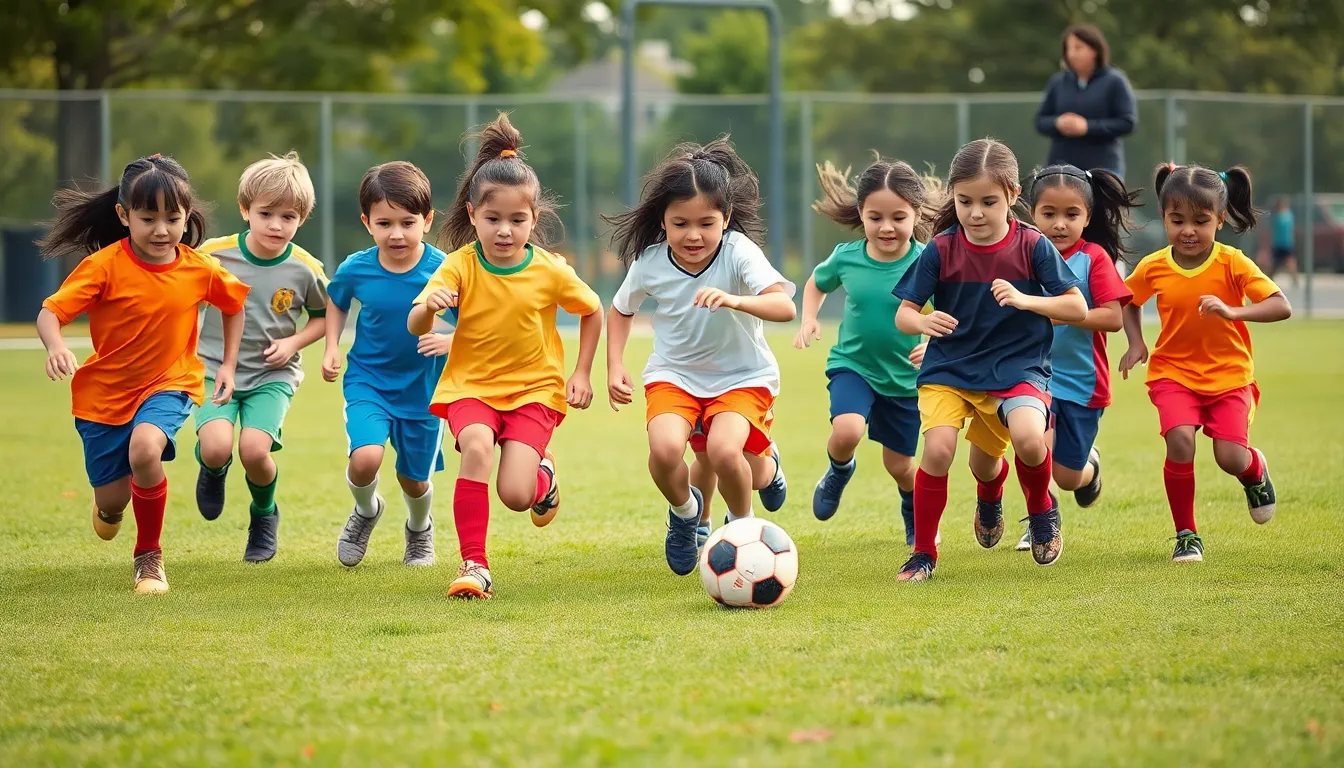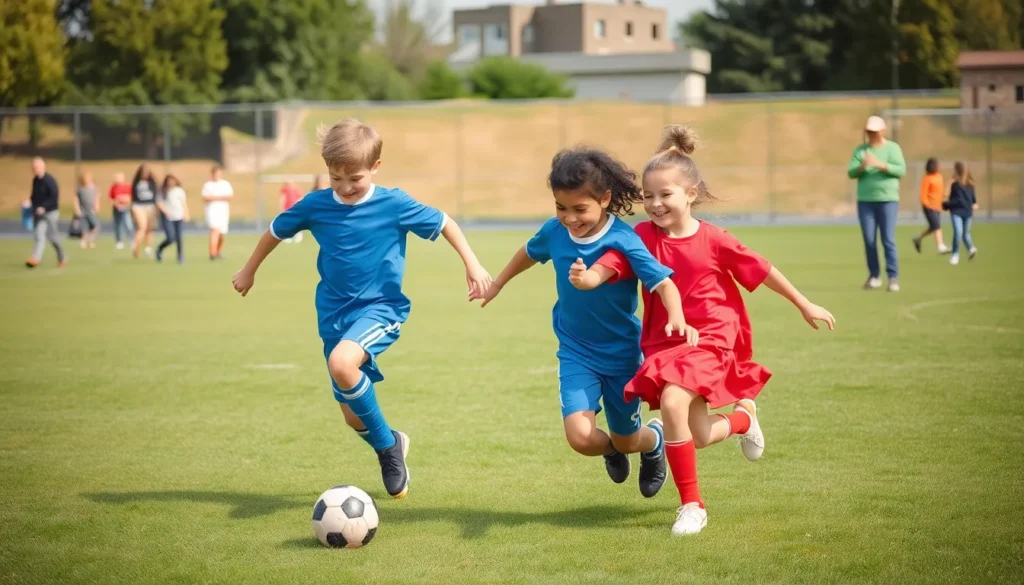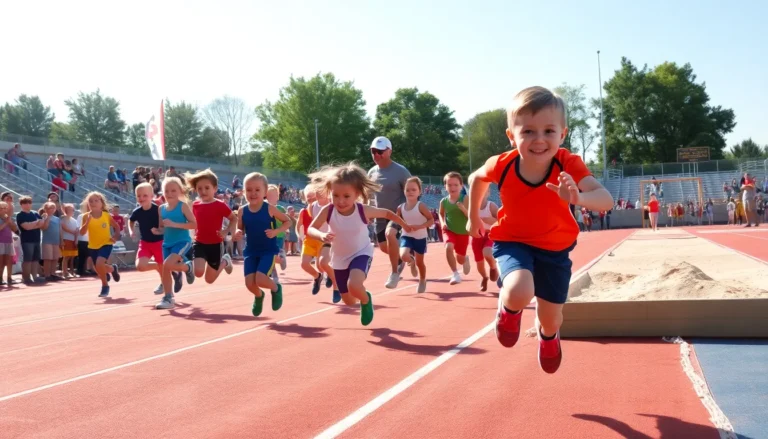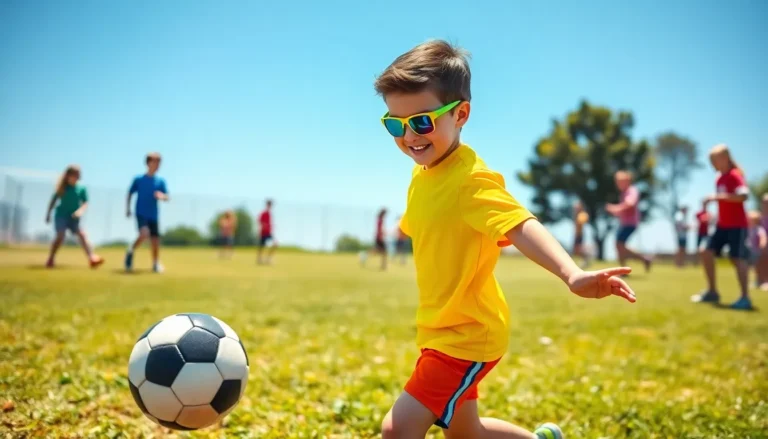Table of Contents
ToggleGetting kids involved in sports is like giving them a ticket to a fun-filled adventure. Introductory sports not only help children develop essential skills but also ignite their passion for teamwork and physical activity. Imagine a world where kids trade screen time for playtime, learning the joy of scoring a goal or making that perfect catch.
Overview of Introductory Sports for Kids
Introductory sports encompass a variety of activities designed for kids, facilitating skill development and teamwork. Soccer, basketball, and baseball serve as popular options, offering children opportunities to learn fundamentals. Participation in these sports enhances coordination, balance, and agility among young athletes.
Groups of children often engage in team sports, learning how to collaborate toward common goals. Coaches frequently emphasize the importance of communication and cooperation, building social skills essential for lifelong interactions. These foundational experiences not only create bonds but foster a love for physical activity that can last through adulthood.
Individual sports like swimming, gymnastics, and tennis also allow children to develop self-discipline and confidence. Attending swim lessons often boosts comfort in the water while gymnastics programs sharpen flexibility and strength. Tennis introduces kids to hand-eye coordination, preparing them for friendly competition.
In many communities, local leagues and programs provide accessible introductory sports. These organizations focus on inclusivity, welcoming children of all skill levels. Such programs typically emphasize fun over competition, ensuring a positive experience that encourages ongoing participation.
Age-appropriate equipment plays a key role in supporting children as they engage with different sports. Using smaller balls and adjusted court sizes helps kids develop skills without overwhelming them. These modifications enable a more enjoyable learning environment, making it easier for children to gain confidence and succeed.
Ultimately, introductory sports represent a powerful tool for physical, social, and emotional growth, setting the stage for active, healthy lives. Engaging in sports teaches valuable life lessons such as persistence, respect, and resilience.
Benefits of Introductory Sports

Introductory sports provide numerous benefits that contribute to a child’s overall well-being. Engaging in these activities promotes physical health and emotional development, equipping kids with essential life skills.
Physical Health Benefits
Participating in introductory sports improves cardiovascular health. Regular activity helps maintain a healthy weight and builds strong bones and muscles. Engaging in physical play enhances coordination, balance, and flexibility. As children learn to master various movements, it significantly reduces the risk of obesity-related conditions. Skills developed in sports like soccer, basketball, and swimming lay a foundation for lifelong fitness habits. Overall, these benefits contribute to a stronger, healthier future for young athletes.
Mental and Emotional Benefits
Introductory sports foster self-confidence and resilience in children. They cultivate important social skills, such as teamwork and communication. Kids learn to set personal goals and celebrate achievements, which boosts their motivation. Engaging with teammates promotes a sense of belonging, reducing feelings of isolation. The excitement of competition introduces valuable lessons in sportsmanship and respect. Overall, these experiences support emotional growth, offering kids tools to navigate life’s challenges successfully.
Popular Introductory Sports
Introductory sports play an essential role in fostering children’s love for movement and teamwork. They provide ample opportunities for skill development and social interaction.
Soccer
Soccer serves as a great introduction to team sports for kids. The game enhances coordination and develops balance through running, kicking, and dribbling. Kids learn to work together towards a common goal, fostering collaboration. Coaches often emphasize sportsmanship and respect for opponents, key values in soccer. Local leagues cater to varying skill levels, ensuring all children can participate. Age-appropriate sizes and equipment enhance the learning experience, making the game accessible and fun.
Basketball
Basketball introduces children to fundamental athletic skills while promoting teamwork. Kids improve hand-eye coordination through dribbling, passing, and shooting. The fast-paced game teaches quick decision-making and communication on the court. Coaches focus on developing individual skills, so every child has a chance to shine. Local programs often create inclusive environments that encourage participation. The social aspect of basketball builds friendships as kids share experiences and celebrate teamwork.
Swimming
Swimming provides a unique opportunity for both individual and group skills development. Children build strength and endurance while learning essential safety skills in the water. They gain confidence as they master strokes and techniques, paving the way for further aquatic activities. Group lessons foster camaraderie, as kids support each other’s progress. Safety remains a priority, with instructors emphasizing proper techniques. Parents appreciate how swimming ensures children stay active while enjoying a fun and engaging environment.
Choosing the Right Sport for Your Child
Selecting the appropriate sport for a child involves understanding their unique interests and abilities. Parents should consider their child’s enthusiasm as well as their physical skills.
Assessing Interests and Skills
Identifying a child’s interests helps in narrowing down sport options. Observing activities they enjoy, like running or playing with a ball, provides insights into their preferences. Testing different sports fosters exploration and encourages engagement. Skills such as hand-eye coordination and teamwork ability also play a role in sport selection. Participating in trial classes or community events can reveal hidden talents. Analyzing how a child responds to various sports helps in making a well-informed choice.
Age-Appropriate Options
Choosing age-appropriate sports is vital for safety and enjoyment. Younger children often thrive in sports that emphasize basic skills. Options like soccer and T-ball introduce teamwork in a fun environment. As children grow, they can progress to activities that require more advanced skills, such as basketball or gymnastics. Sports leagues generally categorize age groups, ensuring that children compete with peers of similar developmental stages. This organization creates a positive experience, boosting confidence and encouraging continued participation. Prioritizing the right age range enhances skill development while fostering a lifelong love for sports.
Introductory sports play a vital role in shaping children’s physical and emotional development. By engaging in these activities, kids not only enhance their athletic skills but also build essential life skills like teamwork and resilience. The right sport can ignite a passion for physical activity that lasts a lifetime.
Parents are encouraged to explore various options and consider their child’s interests and abilities. Finding the right fit can lead to a rewarding experience that fosters confidence and social connections. With a focus on inclusivity and age-appropriate practices, introductory sports create a nurturing environment where every child can thrive. Investing in these early experiences sets the stage for a healthier and more active future.








